The Help
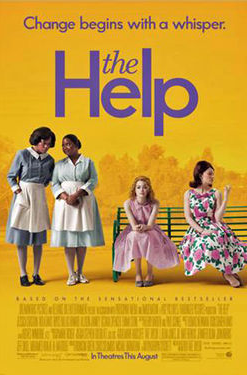
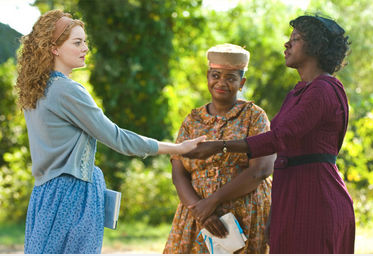 The movie, on the whole, is awfully manipulative, and takes a not-so subtle look at the Civil Rights movement in Jackson, Mississippi in the early 1960s. It somehow manages to be over the top and bombastic, yet curiously muted at the same time. Writer-director Tate Taylor paints his characters in broad stereotypes and simple motivations. The lead heroine is Skeeter Phelan (Emma Stone), an ambitious young woman who's just graduated from college, and has a job doing a cooking column for a local newspaper, but what she really wants to do is write a challenging book that will change the way people think in her town. This desire fuels her so much, she has no interest in finding a boyfriend or husband, much to the chagrin of her mother, Charlotte (Allison Janney). As she closely watches the strained relationships between her wealthy, socialite friends and their black housemaids, Skeeter decides that she wants to write a book written from the point of view of the housemaids, completely uncensored.
The movie, on the whole, is awfully manipulative, and takes a not-so subtle look at the Civil Rights movement in Jackson, Mississippi in the early 1960s. It somehow manages to be over the top and bombastic, yet curiously muted at the same time. Writer-director Tate Taylor paints his characters in broad stereotypes and simple motivations. The lead heroine is Skeeter Phelan (Emma Stone), an ambitious young woman who's just graduated from college, and has a job doing a cooking column for a local newspaper, but what she really wants to do is write a challenging book that will change the way people think in her town. This desire fuels her so much, she has no interest in finding a boyfriend or husband, much to the chagrin of her mother, Charlotte (Allison Janney). As she closely watches the strained relationships between her wealthy, socialite friends and their black housemaids, Skeeter decides that she wants to write a book written from the point of view of the housemaids, completely uncensored.
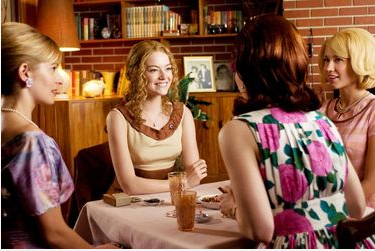 This in itself is a dangerous notion during the time period Skeeter lives. One of Skeeter's friends, the spoiled Hilly Holbrook (Bryce Dallas Howard) is trying to get a movement passed in the local government that will force the black housemaids to use a separate outdoor bathroom away from the house where they work, and it eventually succeeds. On TV, there are reports of civil rights riots, rallies, and racial murders. Skeeter knows that she will have a hard time convincing anyone to come forward and be open with her about the truth, but she is eventually able to talk housemaid Aibileen Clark (Viola Davis) into participating on her project, and letting her tell her story. Before long, Aibileen's hot-tempered and outspoken best friend and fellow housekeeper, Minny (a wonderful Octavia Spencer), joins in on the book as well.
This in itself is a dangerous notion during the time period Skeeter lives. One of Skeeter's friends, the spoiled Hilly Holbrook (Bryce Dallas Howard) is trying to get a movement passed in the local government that will force the black housemaids to use a separate outdoor bathroom away from the house where they work, and it eventually succeeds. On TV, there are reports of civil rights riots, rallies, and racial murders. Skeeter knows that she will have a hard time convincing anyone to come forward and be open with her about the truth, but she is eventually able to talk housemaid Aibileen Clark (Viola Davis) into participating on her project, and letting her tell her story. Before long, Aibileen's hot-tempered and outspoken best friend and fellow housekeeper, Minny (a wonderful Octavia Spencer), joins in on the book as well.
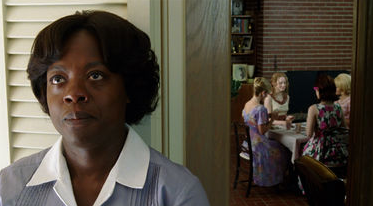 Both Aibileen and Minny come across as intelligent, personable, and funny women, and the performances by Davis and Spencer are first-rate. But the movie keeps us at a distance, telling us just enough to be intrigued, only to pull back. I blame a lot of this on the film's disjointed narrative, which hops around from one plot and character to the next, but never really grounds itself in any dramatic tension, aside from the random racist remark or insult flung by one of Skeeter's prissy socialite friends. This is a movie that deals with some tricky issues in an overly sanitized and safe manner. The black characters are fairly wise and saintly, while the whites are either kindly crusaders for civil rights, or cold-hearted racists who fling their hateful comments in such a calculated and scripted manner, the film almost seems to be daring for the audience to verbally boo and hiss the characters. This is an overly calculated movie that seems to be trying to push every emotional button imaginable, but it never pushes hard enough - At least it didn't for me.
Both Aibileen and Minny come across as intelligent, personable, and funny women, and the performances by Davis and Spencer are first-rate. But the movie keeps us at a distance, telling us just enough to be intrigued, only to pull back. I blame a lot of this on the film's disjointed narrative, which hops around from one plot and character to the next, but never really grounds itself in any dramatic tension, aside from the random racist remark or insult flung by one of Skeeter's prissy socialite friends. This is a movie that deals with some tricky issues in an overly sanitized and safe manner. The black characters are fairly wise and saintly, while the whites are either kindly crusaders for civil rights, or cold-hearted racists who fling their hateful comments in such a calculated and scripted manner, the film almost seems to be daring for the audience to verbally boo and hiss the characters. This is an overly calculated movie that seems to be trying to push every emotional button imaginable, but it never pushes hard enough - At least it didn't for me.
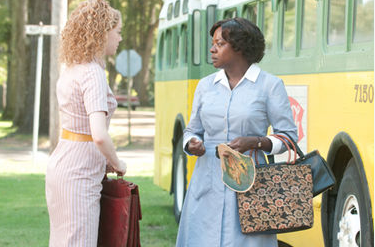 I understand The Help is supposed to be a melodrama, and I kept on waiting to get swept away in it, or for my eyes to water a little. I'm sad to report that my eyes remained dry for the entire two and a half hours it runs. Once again, I blame the narrative, which likes to set up plot points, completely abandon them for long periods of time, bring them up again, only to abandon them again. This prevented me from really getting close with the characters, or feeling the emotions that the story was desperately trying to stir up within me. For example, early in the film, we learn that Minny has an abusive husband (or boyfriend?), as well as a large number of kids. As soon as this aspect is established, it's pretty much dropped, only to be brought up again once or twice in the movie in fleeting passes. I have a feeling that this is supposed to be a driving motivation for the character, but the movie treats it in such a careless manner, it never registers. There is also a subplot concerning Skeeter being upset that her mother has fired their old housemaid, Constantine (Cicely Tyson). The relationship between Skeeter and Constantine is obviously supposed to be a key factor in Skeeter's different views, and part of the inspiration for her book, but they only share once scene together in a flashback, and is only mentioned one other time late in the film, so we never really get a true sense of what kind of relationship they had.
I understand The Help is supposed to be a melodrama, and I kept on waiting to get swept away in it, or for my eyes to water a little. I'm sad to report that my eyes remained dry for the entire two and a half hours it runs. Once again, I blame the narrative, which likes to set up plot points, completely abandon them for long periods of time, bring them up again, only to abandon them again. This prevented me from really getting close with the characters, or feeling the emotions that the story was desperately trying to stir up within me. For example, early in the film, we learn that Minny has an abusive husband (or boyfriend?), as well as a large number of kids. As soon as this aspect is established, it's pretty much dropped, only to be brought up again once or twice in the movie in fleeting passes. I have a feeling that this is supposed to be a driving motivation for the character, but the movie treats it in such a careless manner, it never registers. There is also a subplot concerning Skeeter being upset that her mother has fired their old housemaid, Constantine (Cicely Tyson). The relationship between Skeeter and Constantine is obviously supposed to be a key factor in Skeeter's different views, and part of the inspiration for her book, but they only share once scene together in a flashback, and is only mentioned one other time late in the film, so we never really get a true sense of what kind of relationship they had.
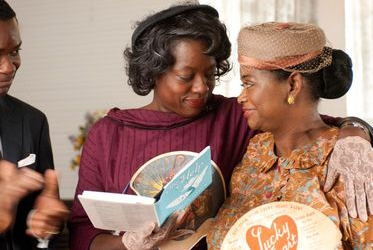 I really have no problem with The Help taking a safe and audience-friendly approach at a harsh subject. Sadly, I've grown used to that. I was more bothered with how little I cared about the characters themselves. All the performances are just fine, and sometimes even great, but I never once believed I was watching real people up on the screen. That's just how calculated the movie is. Everyone who walks on screen is designed to create a specific audience response, and shoves it in our face without the slightest bit of grace or subtlety. It's almost like the filmmakers are afraid we won't get the point. I grew weary after a while. This is a movie that's obviously been made with great care, but the screenplay is a jumbled mess of manipulation, stereotypes, and characters so broad they border on being living cartoons. Would a more subtle approach have helped? Well, I probably wouldn't have felt like I was being talked down to so much. If there was just one character who didn't feel like they came across as a calculated caricature, I probably would have liked this movie a lot more.
I really have no problem with The Help taking a safe and audience-friendly approach at a harsh subject. Sadly, I've grown used to that. I was more bothered with how little I cared about the characters themselves. All the performances are just fine, and sometimes even great, but I never once believed I was watching real people up on the screen. That's just how calculated the movie is. Everyone who walks on screen is designed to create a specific audience response, and shoves it in our face without the slightest bit of grace or subtlety. It's almost like the filmmakers are afraid we won't get the point. I grew weary after a while. This is a movie that's obviously been made with great care, but the screenplay is a jumbled mess of manipulation, stereotypes, and characters so broad they border on being living cartoons. Would a more subtle approach have helped? Well, I probably wouldn't have felt like I was being talked down to so much. If there was just one character who didn't feel like they came across as a calculated caricature, I probably would have liked this movie a lot more.
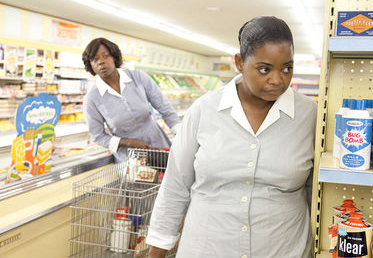

See the movie times in your area or buy the DVD at Amazon.com!






0 Comments:
Post a Comment
<< Home